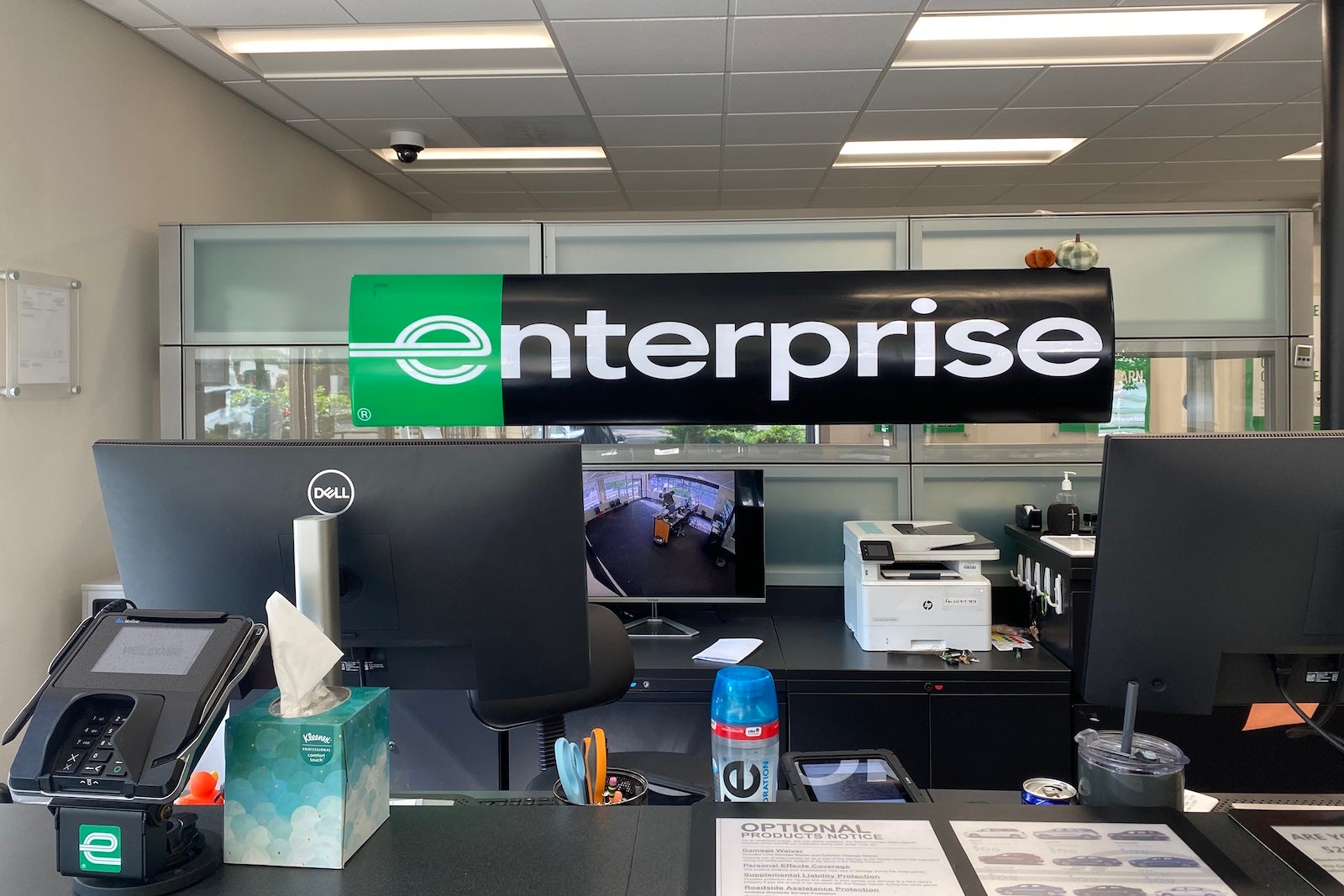All You Need To Know About Using A Debit Card To Rent A Car

If you are an elder millennial like myself and have lived in walkable cities since graduating from college, you may have never rented a car before.
I used Kyte three years ago, but before last month, I had never booked a car rental under my name.
Since I was relatively unfamiliar with the ins and outs of renting a car, I was surprised to learn that major rental car companies do not make it easy to use a debit card to rent a car.
Here’s what you need to know if you want to use a debit card to rent a car.
Extra requirements to use a debit card
To start, know that the rules about renting a car with a debit card vary by both company and location, so you should call the specific rental car location and company you’re hoping to use to verify their policy ahead of time.
I wish I had done that rather than find out we would not be able to use a debit card to get a car at Enterprise’s Seattle Lake City office.
Most major rental car companies, including Enterprise, Hertz and Budget, require at least one of the following to use a debit card:
- An additional deposit
- Multiple forms of identification beyond your driver’s license, such as a passport or utility bill
- Proof of insurance
For example, Enterprise charges debit card users a deposit of $200 to $850 at the time of rental to “account for Renter potentially incurring additional amounts owed under the rental contract.” The deposit amount varies based on the rental location and vehicle class.
CAROLINE TANNER/THE POINTS GUYAdditionally, Enterprise requires debit card users at most nonairport locations to meet the following conditions:
- The name and address shown on the renter’s driver’s license must match their current home address.
- A renter’s address must be within 50 miles of the renting branch, or the renter’s driver’s license must be from the same state where the rental branch is located.
- Renters must present a utility bill with no past-due balance or disconnect notice.
- Renters must present one of the following items: a cellular phone bill, paycheck or original declaration page from an active auto insurance policy. The bills must be the original bill, dated within the previous 30 days and have an address that matches the renter’s current home address.
Unless you knew about these policies beforehand, you will probably not have these documents on you during a trip. And even if you do have them with you, the extra paperwork can still make the overall process cumbersome.
You might have to jump through some more hoops, too, including undergoing a credit check before renting, and you might be required to show proof of a return ticket at some rental car companies’ airport locations. It might go without saying, but rental companies will not accept prepaid cards either.
Additional restrictions: Age, location, car type
More reasons to use a credit card to rent a car
As you’ve probably gathered by now, rental car companies do not make it easy to use a debit card. Renting a car by credit card can be more practical for a few other reasons, too.
Using the right card ensures your rental car is protected should something go wrong, such as theft, damage, injury and potential loss of life. Credit cards also generally provide higher coverage amounts than the policies offered by the rental car company. Just note that most cards offer secondary insurance for rental cars, meaning your primary coverage will be applied first.
Secondary insurance only kicks in after other types of insurance, such as travel insurance or personal car insurance, have been used. After that, secondary insurance is applied to cover any remaining expenses to be paid, such as deductibles on those other policies. Both types of insurance offer maximum coverage amounts, so be sure that the amount at least meets the total value of the car you’re renting.
Secondly, certain cards offer perks at specific rental car companies. For example, The Platinum Card® from American Express offers automatic National Emerald Club Executive status, Avis Preferred Plus status and Hertz Gold Plus Rewards President’s Circle status, among other perks (enrollment required for select benefits).
People with a United Club℠ Infinite Card get complimentary Avis President’s Club status, which includes free upgrades of two car classes, guaranteed car availability when booking at least 24 hours in advance and expedited rental service.
Best credit cards to use to rent a car
UNIVERSAL IMAGES GROUP/GETTY IMAGESSome of the best travel rewards cards provide car rental insurance with a collision damage waiver when you use the card to book a rental. This waiver can cover rental car accidents, theft or damage.
The following cards offer primary car rental insurance on most rentals while also offering earnings for travel purchases, making them great cards to use for rental cars:
- Chase Sapphire Reserve®
- Chase Sapphire Preferred® Card
- Capital One Venture X Rewards Credit Card
- Ink Business Preferred® Credit Card
- Ink Business Cash® Credit Card
- Ink Business Unlimited® Credit Card
- United℠ Explorer Card
- United Quest℠ Card
- United Club Infinite
- United℠ Business Card
- Any American Express card that’s enrolled in the American Express Premium Car Rental Protection program
If you don’t need primary insurance, consider using one of the below cards, which give secondary car rental insurance:
- Capital One Venture Rewards Credit Card
- Capital One VentureOne Rewards Credit Card
- Chase Freedom Flex®
- Chase Freedom Unlimited®
- Amex Platinum
- American Express® Gold Card
- Marriott Bonvoy Brilliant® American Express® Card
Most American Express cards offer secondary car rental insurance.
Several of our favorite travel cards can earn you points or miles when you book car rentals through credit card travel portals, including:
- Chase Sapphire Reserve: 10 points per dollar spent on hotels and car rentals when you purchase travel through Chase Travel℠
- Chase Sapphire Preferred: 2 points per dollar spent on travel purchases
- Capital One Venture X: 10 miles per dollar spent on hotels and rental cars booked through Capital One Travel
- Capital One Venture Rewards Credit Card: 5 miles per dollar spent on hotels, vacation rentals and rental cars booked through Capital One Travel
Bottom line
ADAMKAZ/GETTY IMAGESWhile it’s possible to rent a car using a debit card, the process is much more complicated, and you don’t get the perks of using a credit card, including the possibility of earning bonus points and miles.
Therefore, we recommend using one of the above credit cards to make the most of renting a car. Doing so will give you the security of knowing you have insurance while allowing you to earn points or miles for your purchase.
Related reading:
- Credit cards that offer elite status for car rentals
- 9 rental car rewards programs you need to know about
- Save money on your next trip: Use these tips to never pay full price for a rental car
For Capital One products listed on this page, some of the benefits may be provided by Visa® or Mastercard® and may vary by product. See the respective Guide to Benefits for details, as terms and exclusions apply.


